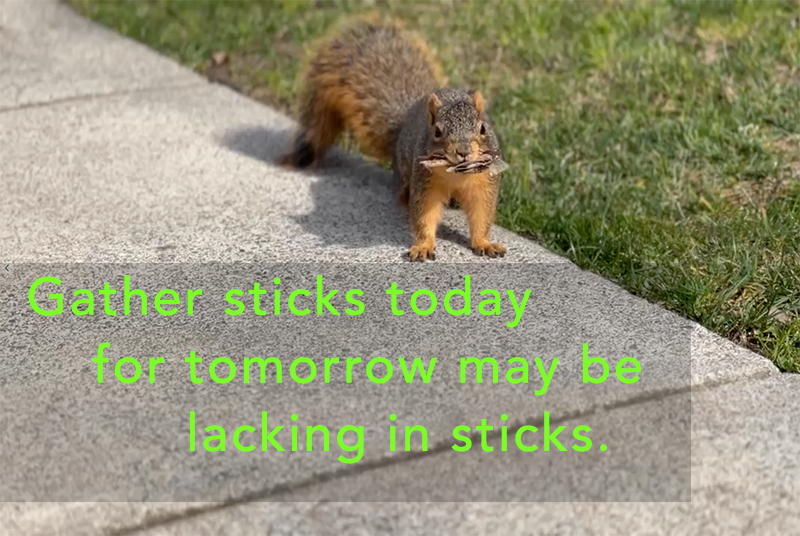When people use fridge magnet wisdom to justify bad behavior
I love fridge magnet wisdom. It’s the staple of Instagram self-help gurus and people who design posters that hang on the wall in your dentist’s office.

Spend an hour scrolling LinkedIn or Instagram and you’re almost certain to come across pithy inspirational bits of wisdom such as the ones below.
These all have good ideas at their core. But they all can be misused or even weaponized to excuse bad behavior.
Never give up! Great things take time.
“Never give up” celebrates the ideal of perseverance. Good ol’ stick-to-it-iveness.
Every week I see stories like this: “I got rejected two hundred times, but finally I landed the perfect job! Never give up!”
Super inspiring, right?
That sounds great on its surface—giving up gets you nowhere, but sticking with it will work out in the end.
In reality, that’s the story of a dysfunctional system. By congratulating the applicant on getting hired, we don’t address the utter failure of the system that led to 200 rejections. Then think about the 200 hiring managers who had to review and reject that individual, and then all the other people clogging the system on their way to 200 rejections. This is not a system to be celebrated.
Perseverance can also be weaponized against creativity and new ideas.
Someone who is afraid of a new approach, or whose power depends on doing things the old way, may insist that persevering with a bad plan is more virtuous than “giving up.”
Sometimes, giving up is exactly what is needed to make room for a better approach.
Hire for potential, not years of experience.
“Hire for potential” invokes the idea that raw talent can be just as valuable as experience.
I’ve known quite a lot of young, inexperienced, hyper-talented people. I have hired a few myself. Having years of experience does not guarantee that someone has actually learned from that experience, or that the experience will be valuable.
On the other hand, “hire for potential” can also be camouflage for ageism.
When I was in tech startups in the 1990s, the joke among us hyper-talented whippersnappers was that the old IBM “blue suits” were dinosaurs whose long experience was more a detriment than a benefit. That, I now know, was ageism. It was wrong then. It’s wrong now.
Hiring someone because they have incredible talent and potential is great. Eliminating years of experience as even a consideration is very likely ageism in that it gives tacit permission to pass over highly qualified, older candidates.
Reducing an individual to a single dimension—no matter which dimension you choose—is lazy, shortsighted, and unfair.
Anyone who has ever made anything of importance was disciplined.
Coming from good, hardworking New England stock, I know that “being disciplined” is to be considered a virtue.
The American ethos is built on this idea. Just work hard, and you’ll go far. Don’t be afraid of good, hard, honest work.
Genius is 1 percent inspiration and 99 percent perspiration.
Credited to Thomas Edison
Inherent in this thinking is that hard work is equated with virtue and success. If you are successful, then you have worked hard.
The flip side of this is that if you aren’t successful, it’s because you haven’t worked hard enough.
This thinking ignores a lot of other factors. Pre-existing inequities. Systemic biases. Timing and luck.
For someone who comes from a privileged background—stable home, decent schools, never went hungry, had access to college—discipline might make all the difference. (So would a million dollar loan from their father to get things going.)
But for someone who came from a marginalized group—without sufficient stability, nutrition, or education—the idea of “work hard and you’ll go far” may actually be “work hard and you might survive another week.”
Praising discipline as the way to succeed allows the lucky people to feel virtuous when they see more and more people being evicted, standing in food lines, or setting up fundraiser pages just to make ends meet. “I don’t need help because I am disciplined and work hard,” the logic goes. “Those people would also not need help if they had enough discipline and worked harder.”
Magically leveling the playing field by leaning too heavily on a single idea like discipline or effort, quashes any discussion of systemic bias and pre-existing inequities. This kind of language could be used to justify racism, classism, sexism, or many other -isms.
Beware wisdom that oversimplifies everything
Fridge magnet wisdom can make you stop and think about something in a different way.
“Live in the moment” is a terrific sentiment—be present now, see the joy and beauty around you, truly experience life as it is.
But don’t turn it inside out and use “live in the moment” as code for “ignore all consequences.”
“Be your authentic self” is a beautiful idea, one which I promote frequently. Understand who you are at your core, and try to live according to your values.
But weaponizing it to equate “being my authentic self” as “doing whatever I want all the time” is simply selfish and boorish.

“Because someone dropped their umbrella on the tracks, causing a lengthy delay.”
(true story)
Think twice before cheering someone’s fridge magnet wisdom
The next time you see a pithy meme with a saying like one of the ones I used above, pause a moment.
Think about what it means on its surface. Think about why someone wrote it, and the good things you immediately take from it.
Then read the comments. Become aware of any group-think or herd mentality you can notice.
Does anyone offer a counter-argument, or is it all just cheering on the wisdom of the original poster?
In this tweet-sized and tiktok-paced world, nuance and depth frequently get lost. There’s value in stepping back, thinking twice, and looking for the holes… especially when everyone seems to agree.
That kind of thoughtful observation and reflection will lead to a greater awareness of the things that bombard you every day, all day. The messages, ideals, pressures, instructions, demands, threats, and much more that not only drive your behavior, but shape your thinking.
So, enjoy the fridge magnet wisdom. I certainly do.
But be one of the people who thinks more deeply about it and looks for the ways in which it can be misinterpreted, misused, or even weaponized.
Be one of the people who sees and appreciates nuance and complexity.
What do you think?
I’d love to hear your thoughts. And if you are interested in having me coach you, your team, or someone you know, drop me a line and we’ll chat.



3 Comments
How paperweight wisdom can kill critical thinking · August 1, 2023 at 7:11 pm
[…] fridge magnet wisdom is benign in that it generates a lot of likes on social media without doing too much damage. In […]
Critical thinking in the little moments - Gray Bear Coaching LLC · August 31, 2025 at 1:53 pm
[…] the same concept behind fridge magnet wisdom and paperweight […]
What’s important to me as a coach - Gray Bear Coaching LLC · September 2, 2025 at 8:29 am
[…] online landscape is littered with people who toss about such fridge magnet wisdom as if it’s all anyone ever needs. Wise-seeming soundbites that either don’t stand up to much […]